Introduction
In the rapidly evolving landscape of technology, the role of Cloud Engineers has emerged as a cornerstone of modern organizational infrastructure. As businesses increasingly transition to cloud computing, these professionals are tasked with designing, implementing, and managing cloud solutions that enhance efficiency and scalability. The importance of Cloud Engineers is underscored by their collaborative efforts with various teams, ensuring that cloud architectures align with overarching business goals.
From deploying applications to fortifying security measures, their expertise not only drives operational success but also positions organizations to thrive in a competitive marketplace. With projections indicating a significant rise in demand for these specialists, understanding the multifaceted responsibilities and essential skills of Cloud Engineers is critical for any organization looking to harness the full potential of cloud technology.
Defining the Role of a Cloud Engineer
A cloud engineer is a specialized technology expert concentrated on the design, implementation, and management of online-based solutions. As organizations increasingly shift to online computing, the role of Computing Specialists has become essential in improving operational efficiency, scalability, and adaptability. These professionals are responsible for deploying applications within virtual environments while ensuring security, efficiency, and optimized performance.
Collaboration is a core aspect of their responsibilities, as Cloud Engineers work closely with software developers, system architects, and IT security teams to develop robust infrastructures that align with business objectives. For instance, Starbucks' adoption of a Progressive Web App (PWA), which is 99.84% smaller than its iOS app, exemplifies the efficiency gains that can be achieved through online solutions. Since implementing the PWA, Starbucks has doubled the number of web users placing orders daily, showcasing how effective technology engineering can drive user engagement and business growth.
Moreover, as internet-based computing continues to reshape organizational functions, the need for computing specialists is anticipated to increase by 30% in 2024, according to industry reports, rendering their role crucial in facilitating innovation and strategic progress across sectors. Expert insights from industry leaders highlight the essential role of cloud specialists, with one stating, 'These engineers are the backbone of modern digital transformation, ensuring that businesses utilize this technology to its fullest potential.
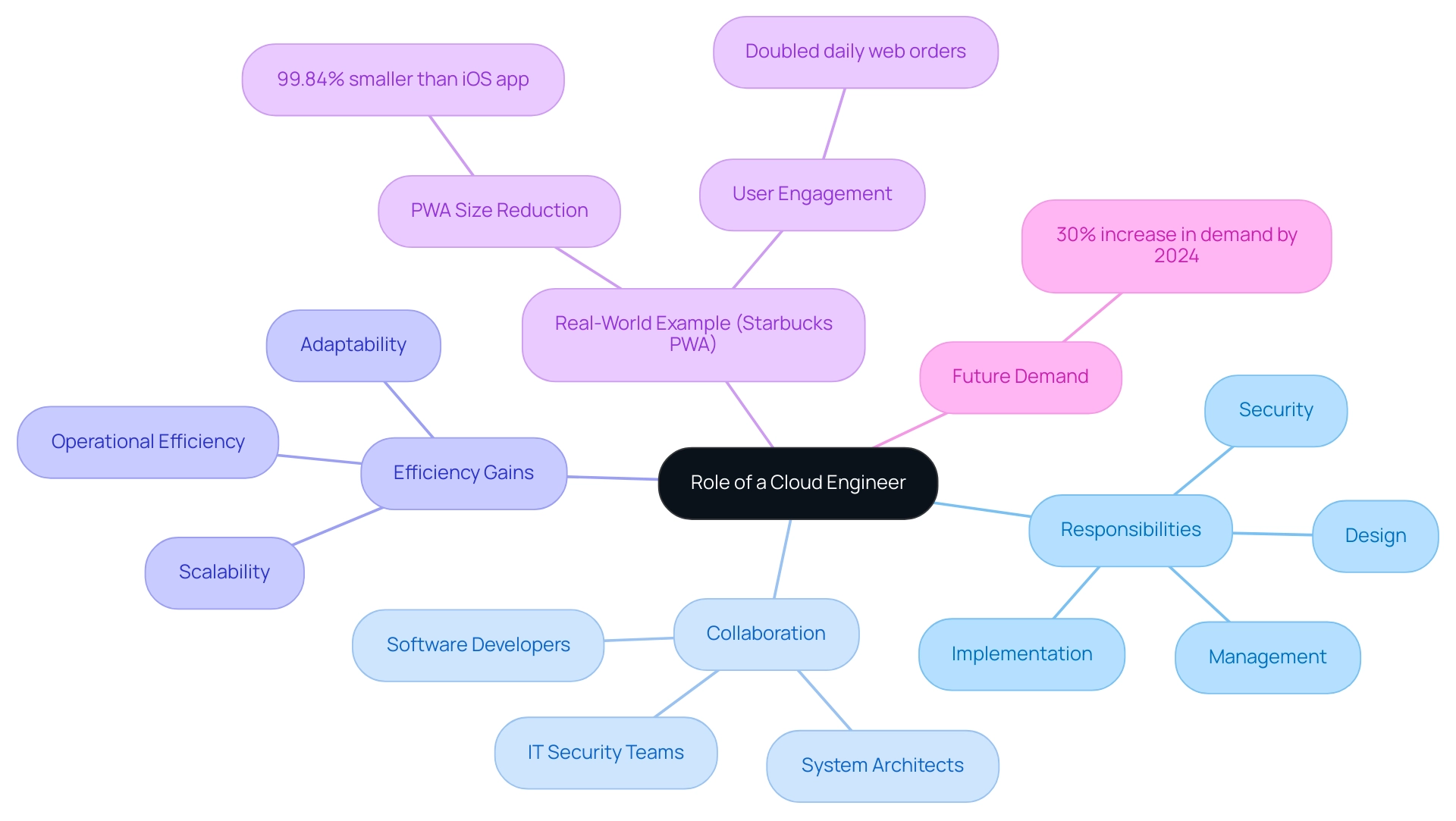
Key Responsibilities and Skills in an AWS Cloud Engineer Job Description
The position of an AWS Engineer includes a wide array of duties essential for the effective implementation and oversight of solutions on the Amazon Web Services platform. In the wake of increasing demand for digital transformation, particularly highlighted by recent shifts in online banking systems, these engineers are pivotal in ensuring organizations can adapt effectively to evolving technological landscapes. DevsData LLC, which has a rating of 5.0 out of 5 based on 37 reviews, exemplifies the quality of AWS-related services available in the market. Their expertise underscores the importance of skilled professionals in this field.
Their key responsibilities typically include:
- Infrastructure Management: Provisioning and managing AWS resources, such as EC2 instances, S3 storage, and VPCs, to create a resilient and scalable environment.
- Automation: Leveraging tools like AWS CloudFormation and Terraform for Infrastructure as Code (IAC), enabling streamlined and efficient deployment processes.
- Monitoring and Optimization: Implementing comprehensive monitoring solutions using AWS CloudWatch to ensure optimal performance and cost-efficiency, allowing organizations to maximize their investments in the platform.
- Security Implementation: Enforcing robust security measures, including IAM policies, encryption protocols, and compliance with industry standards, to safeguard sensitive data and maintain regulatory compliance.
- Collaboration: Engaging with development teams to ensure seamless integration of digital solutions into existing workflows and applications, thereby enhancing operational efficiency.
To excel in this role, an AWS Specialist should possess the following skills:
- Proficiency in AWS services and architecture, enabling them to design effective digital solutions.
- Experience with scripting languages such as Python or Bash, which are essential for automation tasks.
- Familiarity with containerization technologies like Docker and Kubernetes, allowing for efficient application deployment and scaling.
- A strong understanding of networking concepts and security protocols, ensuring that digital infrastructures are secure and reliable.
- Knowledge of DevOps practices and CI/CD pipelines, which are critical for facilitating continuous integration and delivery in digital environments.
According to industry insights, the average salary for AWS Specialists in 2024 is projected to be competitive, reflecting the high demand for skilled professionals in this area. Furthermore, insights from specialists highlight that crucial abilities for AWS professionals encompass a solid grounding in architecture and practical experience with AWS tools.
A significant case study demonstrating the influence of AWS infrastructure management is the creation of a Cleaning Service App for Ride Sharing Vehicles by a Silicon Valley startup. This application enabled Uber/Lyft drivers to efficiently manage vehicle cleaning services, showcasing how effective cloud solutions can enhance operational efficiency and accountability in service delivery.
These responsibilities and skills are crucial for organizations to effectively leverage AWS cloud technologies, ultimately enabling them to achieve their business goals and maintain a competitive edge in the market. Nicholas Johnson, a mentor at YC and former Tesla engineer, stated, 'DevsData LLC is truly exceptional – their backend developers are among the finest I’ve ever collaborated with,' emphasizing the quality of professionals that AWS technology specialists can aim to become.
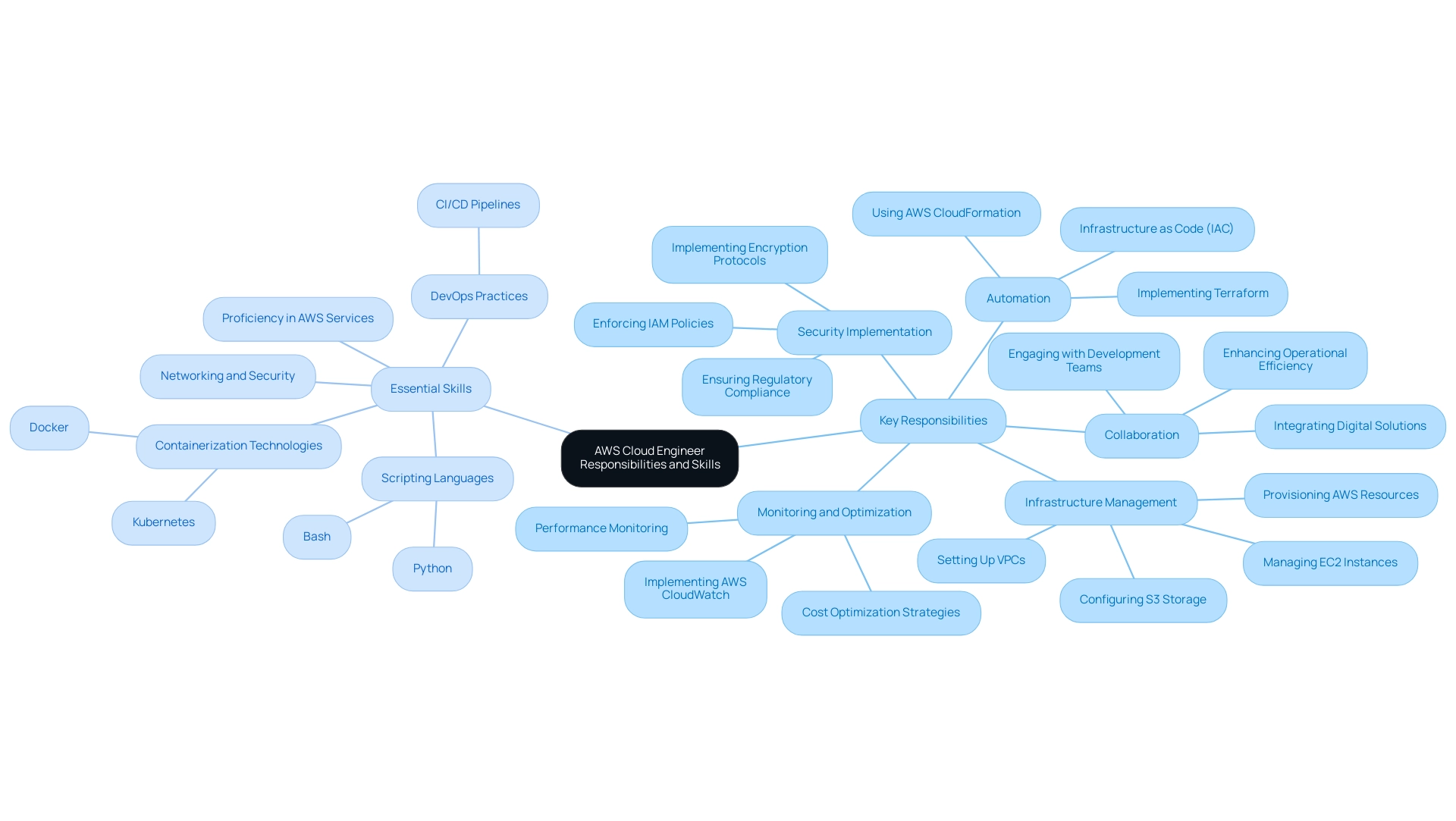
Educational Background and Certifications
Typically, a Computing Engineer should have a bachelor's degree in Computer Science, Information Technology, or a related field. However, practical experience often holds equal weight in this rapidly changing industry. In addition to formal education, obtaining relevant certifications can significantly enhance a candidate's profile. Key certifications for AWS Specialists include:
- AWS Certified Solutions Architect: Validates the ability to design and deploy scalable systems on AWS.
- AWS Certified Developer: Focuses on developing and maintaining applications on the AWS platform.
- AWS Certified DevOps Engineer: Emphasizes skills in automating the testing and deployment of AWS infrastructure.
- AWS Certified Security – Specialty: Emphasizes proficiency in securing AWS environments.
These certifications not only showcase a candidate's technical skills but also their dedication to professional growth in technology.
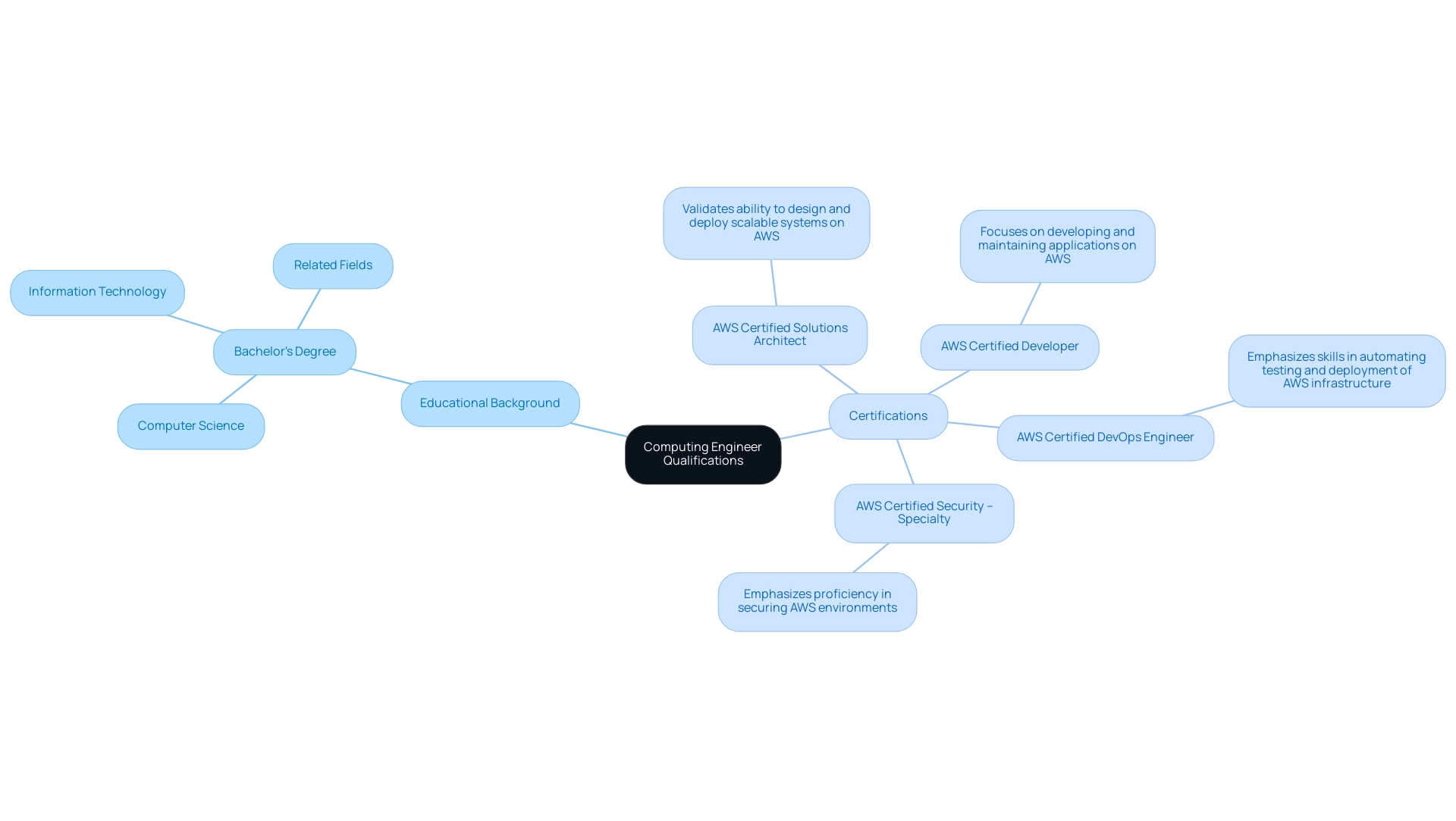
The Importance of Soft Skills in Cloud Engineering
While technical proficiency is indispensable for cloud specialists, a strong set of interpersonal skills is equally essential for achieving project success. In fact, with 94% of businesses already utilizing some form of online computing, the demand for skilled professionals in this field is greater than ever. Among the key skills needed are:
- Communication: The capacity to convey intricate technical concepts to non-technical stakeholders is paramount for ensuring project alignment and clarity. As noted by Christy Alex, a Content Strategist at Alltech Magazine, effective communication can bridge gaps between technical teams and business objectives.
- Collaboration: Effective interaction with cross-functional teams—spanning developers, security experts, and business stakeholders—facilitates successful project execution and fosters a cooperative environment.
- Problem-Solving: Professionals in this field must excel in troubleshooting challenges that arise within digital infrastructures, necessitating both critical thinking and innovative approaches to devise solutions.
- Adaptability: The rapid advancement of technology requires that professionals stay receptive to acquiring knowledge and adapting to new instruments and methods.
These soft skills enable cloud specialists to manage the intricacies involved in cloud initiatives and foster a cooperative environment. For instance, a case study on evolving stakeholder needs underscores the importance of regular check-ins and ongoing education, highlighting how proactive engagement can effectively address stakeholder expectations and maintain project alignment. Furthermore, recent discussions in the industry emphasize that soft skills are increasingly recognized as critical for career advancement in tech roles. By honing these skills, Engineers position themselves to drive successful outcomes in an increasingly cloud-focused landscape.
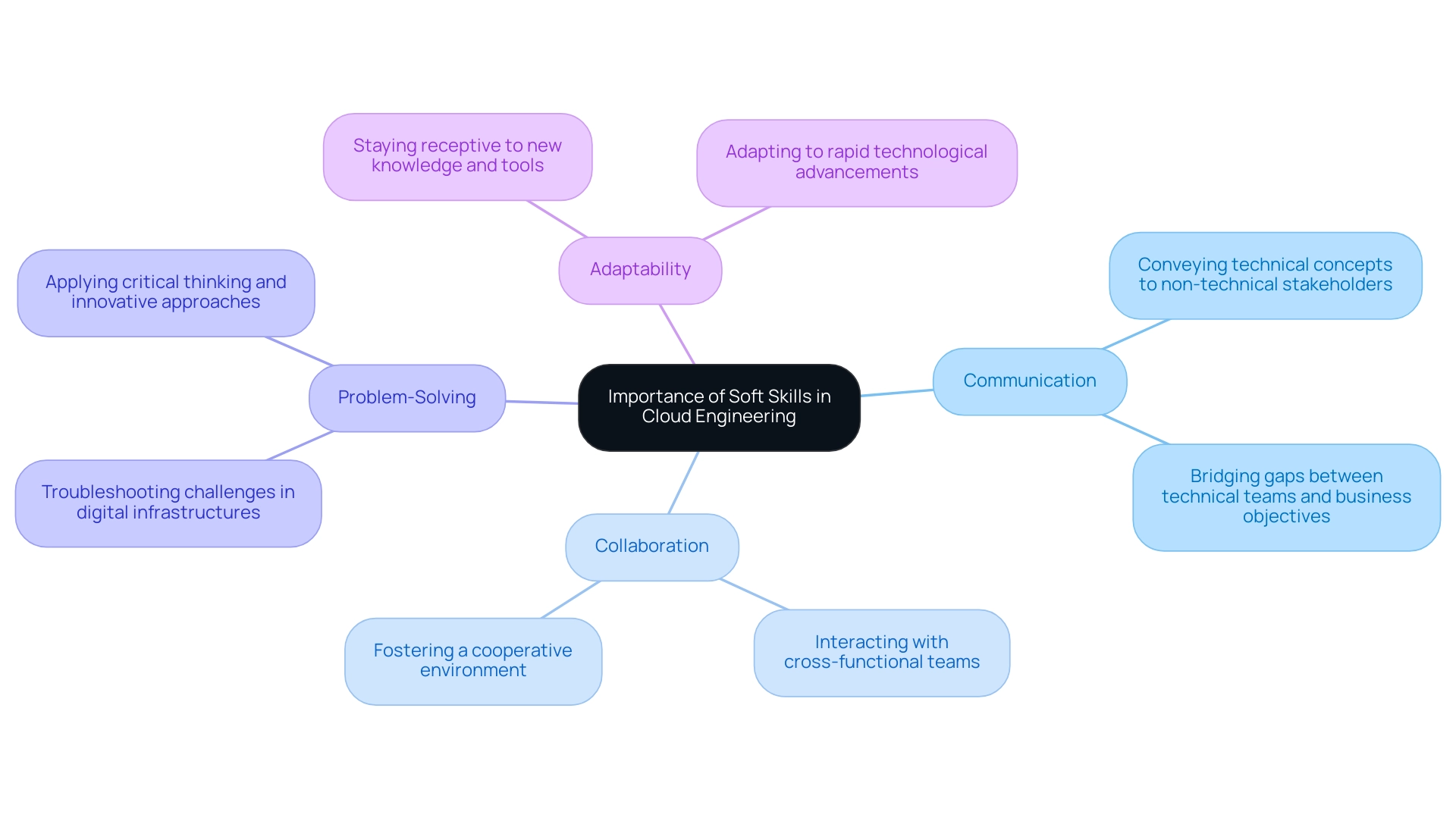
Career Path and Opportunities for Advancement
The career path for a Computing Engineer can vary based on individual interests and organizational structures. Entry-level positions may include roles such as:
- Support Associate
- Junior Engineer
In these roles, professionals can gain practical experience with online technologies. As they gain expertise, they can progress to mid-level roles like:
- Cloud Solutions Architect
- DevOps Engineer
With experience, Cloud Engineers have the potential to advance to senior positions such as:
- Cloud Architect
- Cloud Engineering Manager
In these roles, they lead teams and drive strategic initiatives. Additionally, specialization in areas like security or data engineering can open doors to niche roles that are increasingly in demand.
The growth of cloud computing continues to expand job opportunities, making this an appealing career choice for technology professionals.
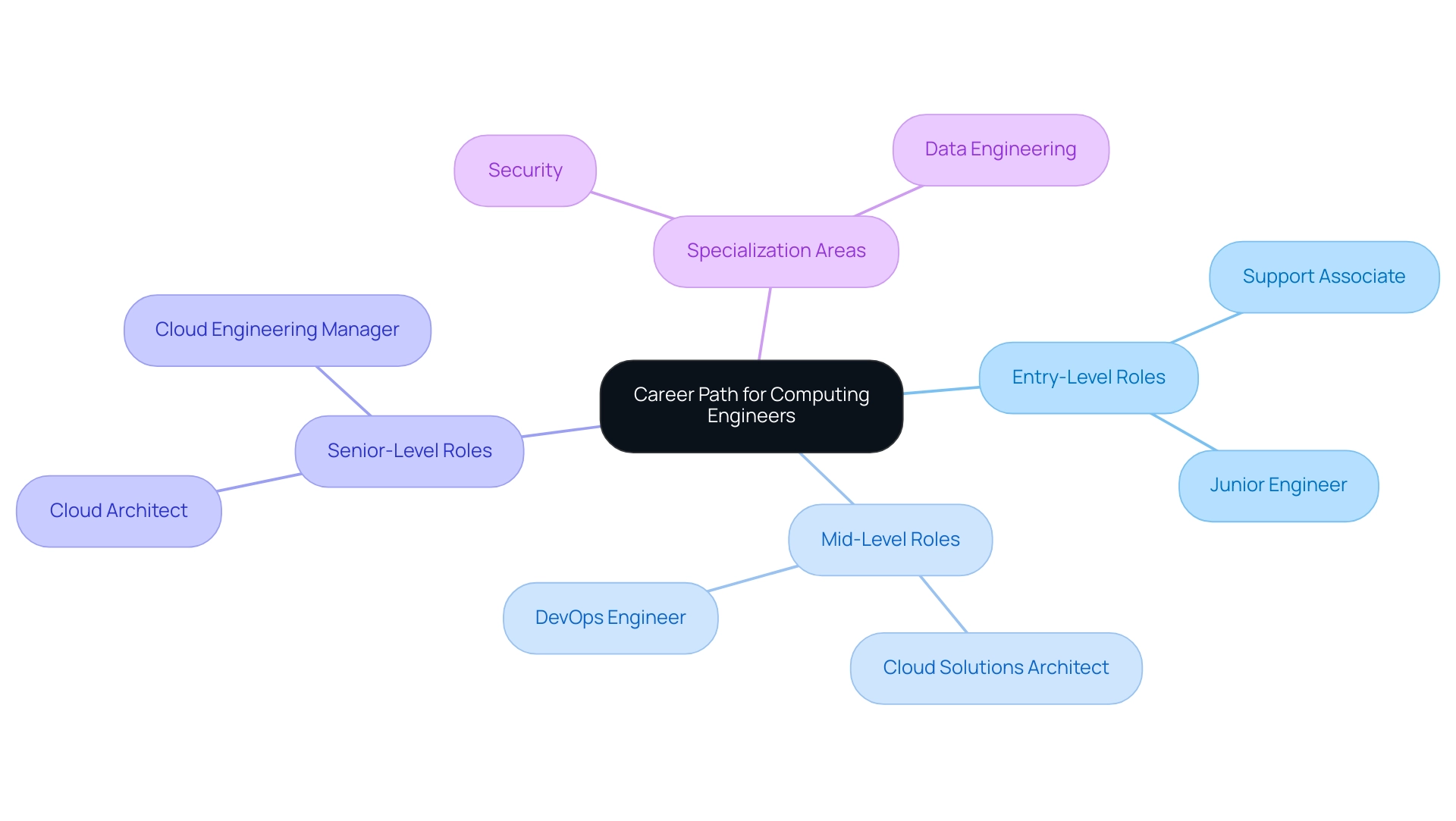
Conclusion
The role of Cloud Engineers has become increasingly vital in the technological landscape, particularly as organizations shift toward cloud-based solutions. Their responsibilities extend beyond mere deployment; they are integral in designing and managing cloud infrastructures that enhance operational efficiency and scalability. By collaborating with various teams, Cloud Engineers ensure that cloud architectures not only meet technical requirements but also align with broader business objectives.
The multifaceted skill set required for Cloud Engineers encompasses both technical expertise and essential soft skills. Proficiency in AWS services, automation tools, and security protocols is crucial, while strong communication and problem-solving abilities facilitate effective collaboration and project success. As the demand for these professionals continues to rise, driven by the accelerating pace of digital transformation, organizations must recognize the importance of investing in skilled Cloud Engineers to remain competitive.
In conclusion, the significance of Cloud Engineers cannot be overstated. They are the backbone of modern cloud computing, enabling businesses to innovate and adapt in a rapidly changing environment. As industries embrace cloud technologies, understanding the roles, responsibilities, and skills of Cloud Engineers will be essential for organizations seeking to leverage the full potential of cloud solutions.
The future of cloud engineering promises to be dynamic and rewarding, offering ample opportunities for those prepared to meet the challenges ahead.




